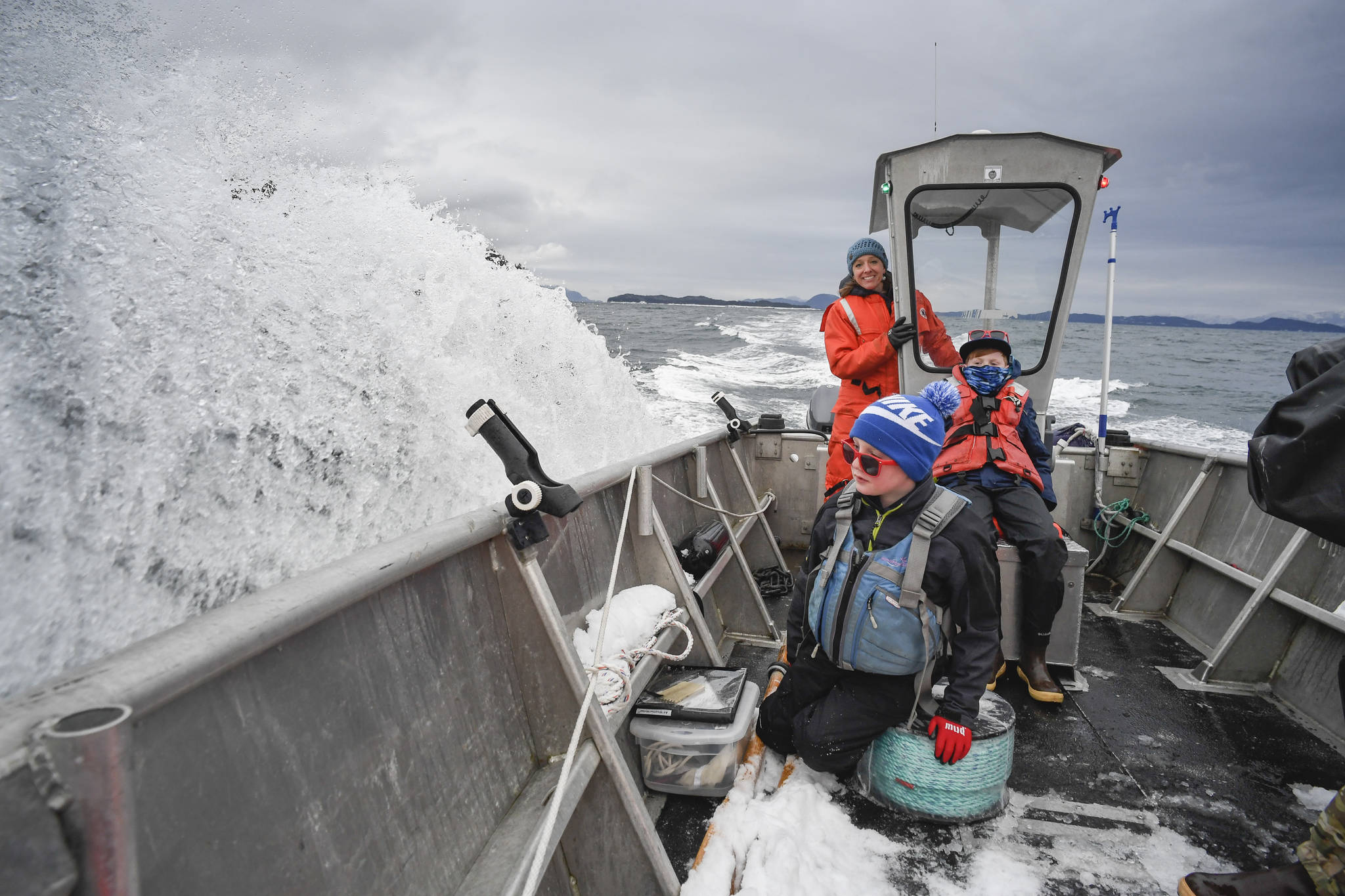The idea was for a family business, something that could “grow old with her kids.”
Meta Mesdag opened the first oyster farm in Juneau. It’s smaller than other oyster farms in the area. Her idea is to keep her business Salty Lady Seafood, Co., local and family-owned. She got the idea for the farm last February, and was up-and-operating by the beginning of summer 2018.
“Though it’s the smallest farm in our community, I feel like the community has really jumped on this in a way that gives us more support than I ever thought would happen,” Mesdag said.
Right now her half-acre farm in Bridget Cove has about 30,000 oysters. Her plan for the future is to get some grow-out rafts, which are larger, and increase the capacity to about 70,000 oysters. But she’s run into some delay getting her business started.
“We try to let what happens, happen,” Mesdag said.
After the initial idea to start a farming business, she started asking around with the Department of Fish and Game about how to get operational. Her original idea was to have something close that her family could reach easily from Juneau. But Fish and Game told her it was not likely for another farm to be permitted on the road system, since you have to get approval from residents in the area to have a farm near homes.
“I was feeling like I was banging my head on a wall trying to find a needle in a haystack,” Mesdag said.
There was already one farm permitted out the road over a decade ago by a man named Tom Manning. He fought for two years to get the permits and wanted to grow geoducks there. But after a few years, he decided to focus on some of his other mariculture farms in Southeast Alaska. So when Mesdag contacted him, he was eager to transfer his lease to her. While it was smaller than she wanted, the opportunity to have a farm so close to Juneau was too good to pass up, so she took it.
“I had been envisioning more of a five acre parcel,” she said at a Juneau Chamber of Commerce luncheon Thursday. “After talking with the state, we realized this was the best chance to get started, because this was going to be the only farm permitted on the road system in Juneau.”
Projections from Alaska’s Mariculture Task Force show that mariculture could become a $100 million per year industry in 20 years, in Alaska. Mariculture specifically refers to shellfish and seaweed.
A winter workday
On Tuesday, she took her two sons, Kai, 8, and Emmett, 11, out of school to help with the oysters. While she normally doesn’t take them out of school to work, they do come help her with the work when the weather isn’t too cold.
Emmett helped collect water samples, which his mom then brings to the university for sampling, while Kai helped take the air and water temperature.
“Your little hands are probably very cold,” Meta Mesdag said, telling both her sons to grab some HotHands.
It was a blistery day, the air temperature just above freezing, with wind chills of 14 degrees. Meta Mesdag’s brother-in-law Josh Dean was also along for the bumpy ride.
She usually comes out to tumble and check on the oysters a few times a week in the summer, and every other week in the winter. Tumbling them helps them get a deeper, harder shell, which makes them easier to sell and better to eat.
When her kids aren’t with her, she sometimes has students from the University of Alaska come along. They do testing for their marine research out in the cove, a win-win for Meta. Instead of having to ship her product off to Anchorage for testing, she knows right away when there’s a harmful algae bloom.
“Having (UA) partner with me was a huge piece to the puzzle,” Meta Mesdag said.
Her oyster origins
Meta Mesdag’s not new to owning a business. She’s been running Catchfly Photography for seven years. It’s important to her to be able to work from a place she can be with her kids.
“Although my photography business provided me with an incredible opportunity to earn an income…the majority of the time I spent working was just staring at a computer,” she said. “I realized there had to be an opportunity out there that included all of us working together.”
Her husband, Alec, chair of the Juneau Economic Development Council board, suggested mariculture as a business for her when she was thinking about building a different type of business.
“It wasn’t just a suggestion to me,” Meta Mesdag said. “It was the answer for what I was looking for for my family.”
Contrary to what one might think, Meta Mesdag is not the salty lady the company is named after — her four-year-old-daughter Wren is. The company’s logo is modeled after a picture of Wren where she had covered her bright red hair in Suavecito styling product to the point it was standing up straight on its own.
“Wren wasn’t the salty lady originally,” Meta Mesdag said. “But it was just too easy because she’s so dang cute. We never called her that before, but we do now. She can’t really work on the farm yet like the boys can, but I think having the name makes her feel like she’s a part of it. She tells everybody, ‘I’m the salty lady.’”
• Contact reporter Mollie Barnes at mbarnes@juneauempire.com or 523-2228.

